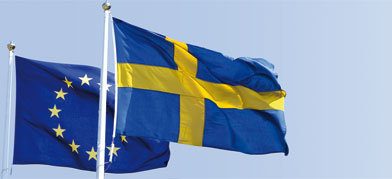
Eliel Stenström, EST Ambassador to Sweden, is a former trainee at the European Parliament and current student at the London School of Economics and Stockholm University, where he studies parallel degrees in Politics, International Relations & Economics and Philosophy & History. He has previously worked as a teacher in global politics and economics, as a recruiter for the Red Cross, and as a board member of the Stockholm Association of International Affairs.

Starting my tenure as ambassador to Sweden for EST, it feels prudent to begin with a very brief overview of the at-times paradoxical relationship between Sweden and the European Union. Whilst Sweden is considered a strong supporter of current EU integration, it is also very skeptical of any further integration.
A good visualization of this reasoning is to look at the Swedish word “lagom”, which in many ways epitomizes Swedish Culture. Lagom is an obvious concept for most Swedes, used daily in all fields of life, yet oddly enough has no direct translation to English. The closest translation would be something in the lines of “Just the right amount” or “Not too much, not too little”.
It is a good description of the Swedish approach to most things, from home decoration to dieting and being social. Yet it is not just a word which is helpful when describing Swedish culture, but also when unfolding its relationship to the European Union.
Let us begin with some facts; Sweden is a small Nordic country with 9 million inhabitants that is also, according to the WEF, the 9th most competitive economy in the world. It is therefore capable of competing in the global market, but it also makes it dependent of said market. These two factors have made the Swedish economy outward looking, with 46.3% of the nation’s GDP deriving from exports, the economy is reliant upon selling goods abroad. The more of a country’s goods and services are sold abroad, the more the country benefits from an internal market where it can compete without tariffs. Similarly, the more goods and services are sold abroad, the more the presence (or absence) of tariffs raises (or lowers) the aggregate costs of producing and selling goods and services.
So why does Sweden’s dependence on external trade matter for EU relations? Because Sweden’s economic dependence on exports as a percentage of GDP at 46.3% is almost twice as much as the UK (27.3%), and significantly higher than both France (28.28%) and Italy (28.56%). Evidently, Sweden is not the only member state in the EU with such a high proportion of GDP in exports, Germany, The Netherlands and Denmark share roughly the same proportion.
Yet is still illustrates that Sweden cuts more costs as a percentage of its GDP due to the EU’s internal market than many other member states, and is thus in a sense more dependent on it and its membership in the EU.
However, despite its dependence on access to the internal market, Sweden has historically not had the warmest opinion on further economic integration with its neighbors. When Sweden had their own ‘In or Out’-referendum on joining the EU in 1994, with a margin very similar to that which the Out-side won in the United Kingdom (52.3% compared to 51.8%). During the Euro launch, Sweden was one of only three countries to reject adopting the Euro following a 2003 referendum with a vast majority of 87% voting in favor of keeping the SEK. Finally, Sweden is known to frequently support the most hawkish block during EU budget negotiators in the European Council.
This all seems to point towards Sweden being a Eurosceptic country, yet this is far from the truth. For all its scepticism towards further integration, polling also consistently shows very high approval of the current state of the EU. If there was a “Swexit” vote today, polling suggests the In-side would win by more than 30%. Sweden’s two largest parties are both strongly in favor of the EU, and Sweden is one out of only a few European countries that has seen an increase in voter participation during recent European Parliamentary Elections.
Obviously there is much more to the Swedish-EU relationship than these figures, and various aspects of it will be discussed by myself and other swedes over the upcoming year. But in order to get a preliminary understanding of the Swedish-EU relationship, it can be helpful to understand the Swedish philosophy of Lagom. The EU should provide just the right amount of integration. If it allowed internal market borders it would be doing to little, but if all its member states must adapt the same currency it would do too much. As a Swede would put it, the EU has a role to play, but it should strive for a Lagom role.
- Articles and Blogs
- Economics
- EU Foreign Policy
- EU Policy Process
- European Integration
- Geen categorie
- International Office articles
- Uncategorized

 The ’Ndrangheta’s Infiltration and Threat to European Institutions
The ’Ndrangheta’s Infiltration and Threat to European Institutions  From Paper to Practice: How Grassroots Norms Undermine Gender Rights in Pakistan
From Paper to Practice: How Grassroots Norms Undermine Gender Rights in Pakistan  Exploited Childhoods: The Role of Global Corporations in Perpetuating and Mitigating Child Labour
Exploited Childhoods: The Role of Global Corporations in Perpetuating and Mitigating Child Labour  Human Rights Challenges in Addressing SLAPPs in Media, NGOs and Journalism in the EU
Human Rights Challenges in Addressing SLAPPs in Media, NGOs and Journalism in the EU 


